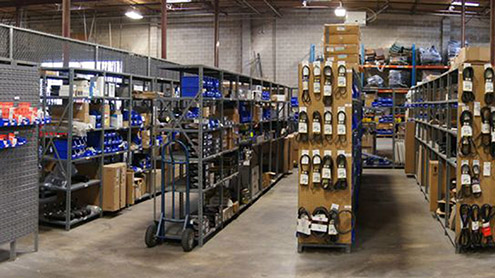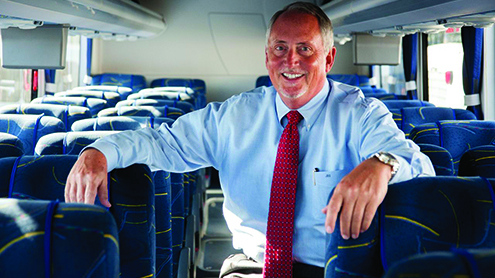

Alliance Bus Group forms to serve and educate customers on the lifecycle of ownership
By David Hubbard
Following UMA Expo 2013 in Orlando, FL, BUSRide posed questions to Atlanta-based Alliance Bus Group. President and CEO Doug Dunn explained the new business model to meet what they see as significant shifts in bus and coach dealerships that involve long-time relationships, consolidation and the many advantages of volume.
What ignited the idea to form Alliance Bus Group?
Alliance Bus Group formed when our four principles operating five companies and dealerships covering six regional territories recognized an opportunity to come together and establish a more meaningful presence in the marketplace. We had known each other for years and enjoyed both personal and professional relationships. [The principles are Doug Dunn, International Bus Group, Atlanta, GA; Nick England, Lasseter Bus & Mobility, Dallas, TX; Eugene Hotard, Bus Group, Inc., New Orleans, LA, and Jackson, FL; and Andy Rolfe, Arcola Bus Sales, New York , NY and| First Class Coach Sales, Orlando, FL.]
As principals, we realized we could not base a merger of this sort solely on the prospect of financial gain. Integrating these four distinct entities under one banner was made easier by virtue of the fact that all sales personnel, service and administrative staff were aligned in their focus on customers over immediate profits.
How is the business model for Alliance Bus Group different from the typical dealership?
The core of Alliance Bus Group is our mandate to proactively serve and educate customers through every phase of the bus ownership experience. We seek to walk customers through our “Lifecycle of Ownership” comprised of five major components:
Adaptive new vehicle financing — Alliance Bus Group has leveraged its relationship with Daimler and built a sophisticated in-house financing capability that allows for creative financing terms designed to fit individual operator business models. The company also has extensive relationships with three other financial partners to yield the most competitive financing packages available.
Ongoing Training —Alliance Bus Group can bring an operator’s service teams to its Atlanta service facility to learn the ins and outs of any new vehicle.
Build to suit — We have seen nearly every business involving a bus come through our doors and can provide input that many operators may have overlooked when developing the specs for a new bus.
Service and support — In addition to experienced and efficient service by our crews across the Southeast and Atlantic coast, Alliance Bus Group also inked a deal which allows its CAIO Motorcoach customers access to over 400 Daimler/Freightliner service centers across North America.
Guaranteed residuals after trade — One compelling advantage of working with a large distributor is the greater capability to sell a bus once an operator is finished with it. For many short-term lease options, the group offers guaranteed residual values. .

What changed in the transition to one company? What stays the same?
Alliance Bus Group is in the process of standardizing the look and feel of each location as well as how service and sales staff address customer needs. However, when a customer walks through the door, they are likely to see most of the same faces.
How does the Alliance Bus Group create greater marketing clout for the OEMs?
We act like a seal of approval. As a distributor with a national presence, our customers tend to put more credence in the vehicles they buy. A strong financial dealer operating seven locations with over 300 buses in our stock inventory is very appealing to any manufacturer. We’re also the national account provider for quite a few.
What is your general approach to representing a wide range of OEMs?
Alliance Bus Group believes in selling the vehicle that is best for the customer or market in a particular area. We carry MFSABs, mid-size and heavy-duty commercial bus and coaches, making the point not to not focus on one OEM over another. We never want our sales reps to be in a position of selling a customer a bus based on what OEM is in stock or some other preference. Certain OEMs work better for particular markets or locations. We feel to have a full line of product offerings to meet the niches within this market gives us a strong advantage.
Does Alliance Bus Group eliminate the competition among the former dealerships?
The previous dealerships worked well together to focus sales efforts in their assigned areas of responsibility for the different bus manufacturers. Addressing these changes early on helped the company develop a seamless cooperation model. After much effort, the various teams have been united into one.
What are the service benefits to the customers of the former dealerships?
Bigger truly has become better. By centralizing operations and consolidating overhead, Alliance Bus Group has been able to exponentially expand its service and support to effectively assist any customer anywhere. Previous localized and somewhat limited service centers and support networks are now a part of a larger, more comprehensive and better coordinated support system. As Alliance Bus Group customers and customer business models evolve, the company must evolve to meet these challenges.
Can you cite specific features to the service and support component?
Alliance Bus Group’s 60,000 square foot service and refurbishment facility, complete with a modern full-size paint booth and 10 service bays, is now accessible to all Alliance Bus Group customers. Relatively new customer service efforts include two seven day per week service hotlines and shared parts inventories.
The company also offers additional driver, maintenance and technical training courses as well as the ability to send service personnel wherever needed. The new programs align well with Alliance Bus Group’s “Along for the Whole Ride” philosophy.
How does Alliance Bus Group handle the aftermarket and parts business?
We operate on a centralized parts warehouse distributing direct to customers as well as our own individual dealership service locations. This is a major initiative to utilize advanced purchasing techniques and effective warehousing, which enables the company’s new commitment to stock key motorcoach and commercial parts in order to support all product lines.
Does Alliance Bus Group enjoy any benefits or advantages in terms of parts inventory, procurement and distribution?
Yes, due to the infrastructure now in place. With our larger pool of resources, consolidated overhead, well-established credit lines, strong vendor relationships and aggressive stocking comes elevated buying power. Much like Alliance Bus Group has leveraged Daimler/Freightliner’s economies of scale to maximize efficiency on CAIO production, with considerable size and volume we have created our own efficiencies within the market.
How does the Alliance Bus Group sales force differ from the previous dealerships?
Our sales team can make full use of our size and national footprint to improve their customers bottom lines. The company has embarked on a continuous process of improvement that seeks to educate and reward sales staff based on their understanding of customer needs throughout the lifecycle of ownership – not just sales figures. BR
